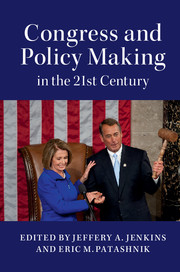Book contents
- Frontmatter
- Contents
- List of Figures
- List of Tables
- List of Contributors
- Acknowledgments
- 1 The Evolving Textbook Congress: Polarization and Policy Making on Capitol Hill in the 21st Century
- PART I CONGRESSIONAL POLICY MAKING IN A POLARIZED AGE
- PART II CONGRESS AND SOCIETY
- PART III CONGRESS AND ECONOMIC POLICY
- PART IV CONGRESS AND DOMESTIC POLICY DILEMMAS
- PART V REFLECTIONS
- 12 Explaining Legislative Achievements
- Index
- References
12 - Explaining Legislative Achievements
from PART V - REFLECTIONS
Published online by Cambridge University Press: 05 February 2016
- Frontmatter
- Contents
- List of Figures
- List of Tables
- List of Contributors
- Acknowledgments
- 1 The Evolving Textbook Congress: Polarization and Policy Making on Capitol Hill in the 21st Century
- PART I CONGRESSIONAL POLICY MAKING IN A POLARIZED AGE
- PART II CONGRESS AND SOCIETY
- PART III CONGRESS AND ECONOMIC POLICY
- PART IV CONGRESS AND DOMESTIC POLICY DILEMMAS
- PART V REFLECTIONS
- 12 Explaining Legislative Achievements
- Index
- References
Summary
LEGISLATIVE ACHIEVEMENTS
What makes for a productive Congress? Scholars have struggled with this question for many years. David Mayhew launched the formal quest for an answer with his provocative book, Divided We Govern (1991, 2005). For Mayhew, a productive Congress is one that generates many important laws, with importance assessed either contemporaneously by journalists or retrospectively by policy experts. Other scholars have compared the laws that Congress enacted with those that it might have enacted. Scholars mining this vein differ in what denominator they use to compare actual bill passage – presidential proposals, party platforms, issues discussed in newspaper editorials – but all agree that a high ratio of bills passed to bills sought is a good measure of legislative productivity.
It is never quite clear why bill production is supposed to be a good measure of legislative achievement. Why are more laws something to celebrate? We do not assess presidents by the number of executive orders issued, courts by the number of trials held, regulatory agencies by the number of rules established, or firefighters by the number of fires fought. Indeed, scholars do not assess each other by the sheer number of books and articles published; accomplished scholars are those rich in ideas, not those with the most pages in print. So why is bill production, or its variant, bills produced as a fraction of bills sought, something that scholars equate with legislative achievement? Once measured, why do scholars spend so much time working to explain fluctuations over time in bill production?
One possibility is that bill production reflects the common notion that whenever a problem is identified, “there ought to be a law” to resolve it. More laws are a signal that Congress is addressing more problems. Unfortunately, people disagree as to whether some situation is merely a condition to be endured (noisy motorcycles) or a serious problem to be solved (gun-wielding terrorists boarding commercial aircraft). Sometimes doing nothing is the better choice. Even when all agree that something is a problem, people disagree as to whether it should be resolved by private action, local government, or national government.
Equating bill production with legislative achievement incorporates a liberal bias into the assessment. In most domestic policy areas, liberals are more inclined to governmental action than are conservatives.
- Type
- Chapter
- Information
- Congress and Policy Making in the 21st Century , pp. 301 - 324Publisher: Cambridge University PressPrint publication year: 2016



